Sun 27 Feb 2011
An Old Time Radio Review by Michael Shonk: SAM SPADE, DETECTIVE.
Posted by Steve under Characters , Old Time Radio , Reviews[24] Comments
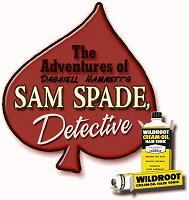
THE ADVENTURES OF SAM SPADE, DETECTIVE. ABC: July 12, 1946 through October 4, 1946. CBS: September 29, 1946 through September 18, 1949. NBC: September 25, 1949 through September 17, 1950; November 17, 1950 through April 27, 1951. Based on characters created by Dashiell Hammett. Produced and directed by William Spier. Cast: Sam Spade: Howard Duff (July 12, 1946 through September 17, 1950), Steve Dunne (November 17, 1950 through April 27, 1951), Effie Perrine: Lurene Tuttle. Announcer: Dick Joy
The Adventures of Sam Spade, Detective was popular with the radio audience and critics alike. While today it is rightfully remembered for its humor and style, the show featured great radio mysteries and moments of drama.
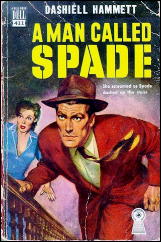
In “Vafio Cup Caper” (August 22, 1948), Sam chases a priceless ancient Greek cup in a mystery with non-stop twists and hilarious dialogue.
In “Edith Hamilton Caper” (April 17, 1949), Sam falls for a woman he believes killed her husband. The episode was dramatic with an effective use of music. Effie’s support for broken-hearted Sam was typical of a series that could be tearfully sad, yet end with a bitterly funny line.
Sam Spade changed when he moved to radio. Howard Duff took Bogart’s cynical loner and let him have fun. Duff’s Spade could get drunk, be short-tempered, and sleep with the femme fatale, and we would be as forgiving and admiring as his secretary Effie.
Some of radio’s top talent worked on the series.
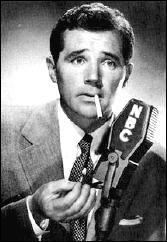
Producer/director William Spier was famous for his popular and critically acclaimed series, Suspense. To promote Sam Spade, Spier aired an hour-long episode “The Khandi Tooth Caper,” a sequel to The Maltese Falcon, on Suspense (January 10, 1948).
Lurene Tuttle (Effie), known as “Radio’s First Lady,” was as important to the show’s success as Howard Duff. Top radio actors would appear, often without billing. Some of the supporting cast were William Conrad, June Havoc, and Hans Conrad.
Behind the mike talent was equally impressive. Jason James (Jo Eisinger) and Bob Tallman won the Edgar award for Best Radio Drama in 1947. Other writers included Gil Doud, E. Jack Newman, and Elliott Lewis.
While Hammett had no direct involvement, the writers made good use of other Hammett characters such as in “Dick Foley Caper” (September 26, 1948). Sam tries to help an old friend from the Continental Detective agency. A highlight was when Sam told the femme fatale he knew she had a gun because it made her bulge in the wrong place.
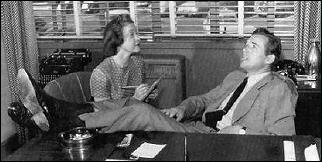
The series did adapt some of Hammett’s short stories. “Death and Company” (August 9, 1946) was adapted from a Continental Op short story with the same title. While no recording survived, the script is reprinted in the book The “Lost” Sam Spade Scripts, edited by Martin Grams, Jr.
It would take outside forces to kill the show. Hammett was blacklisted and his name removed from the credits. When Howard Duff’s name appeared in “Red Channels”, the series sponsor, Wildroot Creme Oil Hair Tonic, canceled the series and replaced it with Charlie Wild, Private Detective (NBC: September 24, 1950 through December 17, 1950. CBS: January 7, 1951 through July 1, 1951).
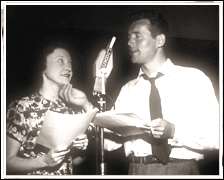
According to Spade expert John Scheinfeld, the last words Duff said on radio for six years was as Spade welcoming Charlie Wild to the PI business. The only thing Charlie and Sam had in common was a secretary named Effie Perrine. No recordings of the radio show exist and who played Effie on radio’s Charlie Wild remains unknown.
Sam Spade was not off the air long. The radio audience demanded the show back and NBC quickly obeyed. The only change in the series had Steve Dunne take over the role of Sam Spade, but it was a change that cost the series its charm.
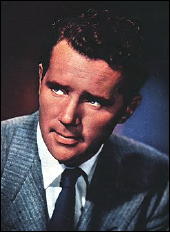
Duff had a light playful touch while Dunne’s delivery seemed forced, often sounding like a bad Jack Benny impersonator. Times were changing. Duff’s Spade was a lovable drunken womanizer, Dunne’s Spade was becoming a boy scout.
The final episode “Hail and Farewell” (April 27, 1951) was an average melodrama about saving an innocent man from execution. At the end Spade told listeners to write in and save the series. But this time the Governor did not call.
So, after over two hundred and forty episodes (around seventy are known to still exist on recordings), it really was “Goodnight Sweetheart.”
SOURCES:
â— On the Air: The Encyclopedia of Old-Time Radio, by John Dunning
â— Radio Detective Story Hour podcast: Jim Widner (otr.com/blog)
â— Boxcars 711 podcast: Bob Camardella (boxcars711.podomatic.com)
â— Sam Spade Double Feature, Volume 1. Audio Archives: Bill Mills (audible.com)
â— OTRR.org
â— Digital Deli (digitaldeliftp.com)
â— MP3 disk with sixty seven episodes of Sam Spade, the Suspense episode “Khandi Tooth Caper”, and other extras. (otrcat.com)
There are many places where you can still find Sam Spade on the web, as well as iTunes and the Sirius XM radio series “Radio Classics.”
February 27th, 2011 at 7:53 pm
This was a popular show at our house when I was a kid, and not just because we liked the Wildroot Creme Oil commercials. It was my introduction to Spade, as I didn’t read THE MALTESE FALCON or see the movie until years after I’d heard the radio shows. I still listen when it comes on XM radio. Duff wasn’t the Spade of the books, but the show is a lot of fun. I never heard any of the post-Duff episodes.
February 27th, 2011 at 8:41 pm
I know my grandparents listened to the show. They lived next door to us, and if we happened to go over when it was on, we had to stay totally quiet until it was over.
I was still only a Tom Mix and Captain Midnight fan at the time, and the Sam Spade shows didn’t mean a lot to me. I’ve listened to all of the ones that exist now, I think, and now I wish I’d paid more attention to the rest of them back then.
February 27th, 2011 at 10:04 pm
Bill, I discovered the radio Sam Spade late when I was 17 and I started with the recordings from Radio Spirits. I loved the Wildroot Creme Oil singers. The humor of the commercials fit the humor of the series well. And we know where Charlie Wild got his name.
Steve, you missed out of some great radio shows, not only in mystery and detective genres but action and adventure series as well.
February 27th, 2011 at 10:22 pm
Yes, I started listening to radio shows when I was eight or nine, which would have been the late 40s. Mostly the five o’clock to six kids’s shows, but I never missed The Shadow on Sunday afternoons.
It was a couple of years before I started listening to all of the adult mystery and adventure shows, but I was limited in part to the one station in town, which carried Mutual programming. Anything else came from several hundred miles away, and the radio dial had to be set very carefully.
But by that time Sam Spade was gone, and a few years later so was everything — shifted over to TV.
February 28th, 2011 at 5:55 am
There were only a handful of radio dramas still on by the time I was old enough to hear them though I do recall having the measles at age six and not being allowed to watch television (it was thought at the time that watching television or any bright light could damage your eyes while you had the measles) and my grandfather introducing me to THE LONE RANGER and GREEN HORNET on radio.
It was with the advent of cassettes and Jim Harmon’s first book on radio that I really got the bug and was able to hear complete serials of I LOVE A MYSTERY as well as series like SAM SPADE. Don’t even want to guess how many hundreds of hours I have now of old radio programs on cassette or CD.
While he had a fairly successful career in film and television Duff’s voice was made for radio, and he was one of the masters of inflection, conveying as much — and more than many actors could with more words and expressions to work with. That ability allowed the writers to get away with a lot on the SPADE series that would have been censored if they had spelled it out.
That was perfect for the Sam Spade character as interpreted on radio and made for one of the most fondly remembered series of the era. I think for a lot of adults it was close to the only really grown up thing on radio at the time, yet done so subtly the kids could listen and never catch on.
I was trying to recall who played the other great fictional eyes on radio (the ones taken from the books). Larry White was Mike Hammer on THAT HAMMER GUY, Van Heflin and Gerald Moher both had turns as Philip Marlowe, Wally Maher and Jeff Chandler were Michael Shayne, Les Tremayne was Nick Charles, J. Scott Smart the Fat Man Brad Runyon loosely taken from Hammett’s Op, Chester Morris was Mike Avallone’s Ed Noon. Of course a lot of the non eye tecs had their radio incarnations too, but I’m just thinking of the eyes.
And of course a small army of original eyes for the medium from Dick Powell as Blake Edward’s singing eye RICHARD DIAMOND to Frank Sinatra’s ROCKY FORTUNE Jack Webb’s PETE NOVAK and YOURS TRULY JOHNNY DOLLAR done by several actors over the years.
SAM SPADE and later CHARLIE WILD featured in a Sunday comic strip ad that ran weekly for Wildroot too, drawn by none other than legendary comic book artist Lou Fine promoting the radio series and the hair cream. Every week Sam and Effie solved a case in the paper that revolved around Wildroot being greaseless and taming tough to handle cowlicks and the like.
My particular favorite of those cases involved a killer hiding in a wax museum. Sam spots him having replaced the wax figure in the electric chair diorama, and explains how if the killer had used Wildroot he would never have noticed his hair was so mussed …
You just don’t get mysteries like that any more.
February 28th, 2011 at 12:02 pm
If there is an interest here, I hope to look at some other radio series.
Some of my favorites include ROCKY JORDON, AMAZING MR MALONE (the short summer series version), BOLD VENTURE, LET GEORGE DO IT (a Sam Spade copy), and CANDY MATSON.
For the softboiled side there is SHERLOCK HOLMES, THE CASEBOOK OF GREGORY HOOD, the three NERO WOLFE, etc.
Check out the free podcasts I list to listen for yourselves. Jack Webb fans must listen to his pre-Dragnet shows, PAT NOVAK (made while Webb worked in San Francisco) and the Hollywood made version, JOHNNY MODERO: PIER 23). Think Webb doing Robert Leslie Bellem straight.
David, the most accepted (from what I can find) research book on old time radio (OTR), ON THE AIR- THE ENCYCLOPEDIA OF OLD-TIME RADIO by John Dunning said this about THE FAT MAN.
“Radio producer Ed Rosenberg felt that a viable detective feature could be spun out of Hammett’s character Gutman in the MALTESE FALCON.”
This kind of he said she said versions of events in radio is common when researching the subject. This is what I referred to in the other recent thread about CAMBRIDGE COMPANION TO AMERICAN CRIME FICTION. Research in OTR is a minefield of opinions and hearsay.
CHARLIE WILD, for example, the usually reliable Thrilling Detective website has Charlie and Sam Spade being the same character. A look above at the weird and confusing time line for Sam Spade shows Charlie on CBS while Sam still was on NBC. (notice the week where ABC and CBS aired their own original episode of Sam). More is known about CHARLIE WILD TV series than the radio version because UCLA Film and TV Archives has 14 episodes and the Paley Center has (reportedly) 4 episodes. Sadly, the only effort to preserve OTR is in the hands of its fans.
February 28th, 2011 at 5:06 pm
Rocky Jordan? Yes.
Go down through the list. Yes, yes, and yes.
Those Jack Webb shows? By all means. Though the written word isn’t going to enough, unless you do a lot of quoting. They’re meant to be listened to, and any fan of hard-boiled fiction does not want to miss either PAT NOVAK or JOHNNY MODERO. It’s too bad that neither show lasted nearly long enough.
http://www.archive.org/details/PatNovakForHire
http://www.archive.org/details/JohnnyMadero
February 28th, 2011 at 5:41 pm
I’ve heard most of the Rocky Jordan and Bold Venture shows. I think they both had fairly short runs. I like ’em both. You can’t go wrong with Sinatra or with Bogie and Bacall.
February 28th, 2011 at 5:42 pm
Oops, I was thinking of Rocky Fortune with Sinatra. I get those Rocky guys confused.
February 28th, 2011 at 6:30 pm
I don’t suppose that either will get confused with Rocky Balboa, though!
Rocky Fortune, the radio character, was sort of a private eye, but maybe an unlicensed one. He worked for an employment agency, as I recall, doing all kinds of odd jobs, but running into murder everywhere he went. This was just before Sinatra was in FROM HERE TO ETERNITY, around 1953 or so. He didn’t need a radio show after that.
ROCKY JORDAN was a much better series, though not many know about it. The leading character was the owner of the Cafe Tambourine in Cairo, where lots of murders and other exotic intrigue took place. Jack Moyles was the star during the first two seasons, but George Raft took over later on. Most of the ones I’ve heard are ones with Moyles, in the late 40s, and they’re all excellent.
March 1st, 2011 at 12:59 am
About the time Sinatra did ROCKY FORTUNE on radio and before ETERNITY he was anglng for the rights to play Mike Hammer on television. I don’t know how serious the idea was, but at least he knew how to wear the porkpie hat — more than you can say for any of he other screen Hammer’s save for Mickey himself.
Michael
I don’t doubt Dunning, or the horses mouth, but most sources say the Op, and actually listening to the series and the film made from it, the Op fits better than Gutman.
It may well be one of those one from column A and one from column B situations since they could easily have taken the title from Gutman and much of the background from the Op (who was short, balding, and stout). Frankly, the character was mostly original being much better paid than the Op.
Brad Runyon of the series was a fairly upscale private eye with a male secretary/assistant/valet, and a penchant for gourmet cooking, but he was pretty tough too. Certainly he wasn’t played anything like Gutman despite the name, Smart’s distinctive voice being nothing like Sydney Greenstreet.
As you say you can never tell with creative types when they start spinning the origins of their ideas — often as not you get contradictory ideas from everyone involved complicated by people who take them at their word. Ego, faulty memory, and outright falsification can make it hard to ferret out any kernels of truth involved.
Re the Sam Spade/Charlie Wild situation it is indeed complicated. Even though there is a transition episode of Spade handing the job off to Wild. I wonder if one of those East Coast/West Coast feed problems is involved? Even as late as the early sixties you had two Ellery Queen’s on television at the same time with I think Lee Patterson the East Coast version and George Nader the West.
Add to that multiple series of the same character and multiple actors in one role (Santos Ortega, George Coulouris, and Sir Cedric Hardwicke as Bulldog Drummond, Brian Aherne and Vincent Price as the Saint, several Johnny Dollars, and Ellery Queen’s) it can be hard to know exactly what was going on when.
It is amazing though some of the characters who made it to radio from the genre aside from the better known series there were series featuring Charlie Chan, Mr. Moto, Pat and Jean Abbot, Ed Noon, Leonidas Witherall, Hugh North (THE MAN FROM G2), Perry Mason, and numerous others. With relatively little needed to do a radio show in terms of seed money there was much more room for experimentation and pilots were more likely to be given a short run on the air than on more expensive television.
March 1st, 2011 at 10:13 am
The Fat Man is a great example of conflicting stories. I have read three different stories. The one I had always believed was The Fat Man was the Op. In the first episode that was possible (certainly more believable than Gutman). But then the Fat Man got a name, a mother, and a girlfriend it lost any connection to any Hammett character.
There is a third story told in Jim Widner’s Radio Detective Story Hour podcast episode 15. He claims Hammett created a character that was a mix of the Op, Gutman and Nick Charles (?!). The podcast examines Hammett’s interest in the radio shows (he didn’t listen to them and only cared the checks cleared). The first episode makes that story possible. But I still lean to Producer Rosenberg paid for the commercially hot Hammett name, not for any of his characters.
Widner’s podcasts are worth listening to because he uses sound bites from that era. In Ep 15 he plays the opening of the Australian version of THE FAT MAN. He also makes a mistake in facts when he claims producer Rosenberg did THE FAT MAN and Spade. The only Spade producer was William Spier.
Two of Widner’s podcasts will be of great interest to Spade fans. Episode 93 has sound bites from producer Spier and star Duff about how Duff was hired (Bogart was considered for the radio show according to Spier). It also plays the SUSPENSE episode promoting Spade. The episode was a sequel to THE MALTESE FALCON. In episode 104, Widner tells us that Lloyd Nolan and Elliot Lewis were considered for the part (Lewis remained involved with the series) and how Spier’s wife got Duff the job. Then we listen to Duff give another version.
I am as certain as I can be, with the limited reliable sources in radio research, that Spade and Wild were not the same character. Reportedly, Wild was a tough guy PI in New York who got beat up every week, solve cases with his fists, and had very little humor. That sounds more like Mike Hammer than Spade. I have read an interview with Duff about the cancellation of the show (in September 1950), as well as media reports of the letter writing campaign to bring Spade back to NBC (both coasts). A month after Spade returns with Steve Dunn, NBC dumped Charlie and the show moved to CBS. The last episode had Dunne asking listeners to write to New York to save the west coast produced series.
For nearly forty years, watching or listening to a CHARLIE WILD has been on my bucket list. Hopefully UCLA will release some Charlies as they did with ROCKY KING.
Many people forget how big radio was before television hit. When you listen to OTR, remember it was the network television (before cable TV) in popularity for its time. Movies were considered better than radio in much the same way we think of movies versus TV today. But more people listen to radio than watched movies. Every major star appeared on radio if only ordered by the studio to promote their latest movie. Cary Grant had a weekly series!
Radio overseas offers some interesting series. I have a MP3 disk of South Africa’s radio version of THE AVENGERS with the characters of Steed and Peel.
In the fifties radio began to lose its number one status as most popular entertainment in numbers to TV. Many consider the end of Sam Spade on radio the end of quality OTR, but a few such as SUSPENSE limped into the early 60s. But before that, radio was the big time.
March 1st, 2011 at 1:46 pm
A couple of corrections for David Vineyard:
– The radio Mike Hammer was Larry Haines, whose greatest fame came from having been the friendly neighbor Stu Bergman on SEARCH FOR TOMORROW fo the whole 30-some-odd years of its TV run. Not exactly the Hammer image, but on radio you could get away with a lot.
– It was 1958 when NBC launched THE NEW ADVENTURES OF ELERY QUEEN as a live-from-NY show with George Nader. In midseason the production was switched to tape-from-LA and Lee Philips replaced George Nader as the lead.
There were no separate feeds for each coast; if there had been, a 50s TV budget could not have accommodated completely separate productions – the actors in one city would have simply done the show twice, as in radio days. As it was, video tape was just statrting to come into widespread use at this time, replacing kinescope film, for delayed broadcasts and coast-to-coast time zone considerations.
(More than you needed to know, right?)
– Chester Morris as Ed Noon?
That’s a new one on me.
I don’t recall that Avallone’s work was ever well-known enough outside genre circles to attract media interest, and unless my memory is completely wrong, Ed Noon’s career was almost entirely post-Golden Age radio.
Also, Avallone’s overheated style would have had to be cleaned up considerably for broadcast media in just about any age.
If I have any of this wrong, by all means let me know.
March 1st, 2011 at 2:09 pm
Mike
There are a few references to an Ed Noon series on the radio, but even though Chester Morris was supposed to play the hero of the show, I don’t know if it ever actually made it to the air. What seems to be true, at least, is that scripts were written:
From https://www.thrillingdetective.com/trivia/avallone.html, for example:
RADIO
* THE WINDUP
(1950-s)
13 episodes
Written by Michael Avallone
Starring Chester Morris as ED NOON
Avallone wrote the scripts for this short-lived series, featuring actor Chester Morris as Noon, which he later adapted for his 1978 kid’s book, 5-Minute Mysteries.
March 1st, 2011 at 5:23 pm
While ON THE AIR does not mention an ED NOON radio series, it does list Chester Morris in two radio series.
BOSTON BLACKIE – June 1944 through September 1944 Summer replacement series on NBC.
ROGUE’S GALLERY he played Rogue in the ABC version (long after Dick Powell left) during November 1950 through November 1951.
ROGUE’s GALLERY must be considered the weirdest PI series ever. Dick Powell played Richard Rogue whose alter ego “Eugor” would talk to him whenever (virtually every week) Rogue was knocked out.
Radio did have regional series and full network (both coast). PAT NOVACK, FOR HIRE began with Webb playing Pat for the ABC West network and produced in San Francisco. When Webb and Richard Breen (creator/writer of PAT NOVACK) left for Hollywood, Ben Morris took over the role of Pat Novack with a different writer (Gil Doud). Breen and Webb decided to do the same show but with a new name, JOHNNY MODERO: PIER 23. Both Pat and Johnny were SF PI on the waterfront (Pat was at Pier 19). Johnny aired on the Mutual network. Breen and Webb returned to Pat when PAT NOVAK was picked up by the ABC national network. (Add to the confusion of regional networks and national networks was the Blue and Red networks that were created when NBC was broken into two networks, NBC and ABC)
So it is possible an ED NOON radio series had been done regionally. If I ever find it, I let you all know here.
March 1st, 2011 at 10:51 pm
I’ve heard several of the Rocky Jordan shows and enjoyed them.
The Fat Man was maybe my favorite show, though. I really liked Brad Runyon, and I liked J. Scott Smart’s delivery (though I’ve heard that others didn’t). I believe only a very few episodes have been preserved. I was such a fan that I went to the movie version of The Fat Man, starring Smart. I still remember it vidily.
March 1st, 2011 at 10:52 pm
Or vividly.
March 1st, 2011 at 11:45 pm
Bill- I have a MP3 disk from otrcat.com that has 47 episodes of THE FAT MAN. It cost $5 plus shipping
March 2nd, 2011 at 4:55 pm
Mike
Re Larry Haines I just plain had the wrong name.
In regard to the Queen show thanks for straightening that out. I forget what my original reference was on that — it was ages ago, and obviously mistaken.
Whether the Ed Noon series was ever actually aired, as Steve showed it was written and cast. I haven’t seen any reference to it other than the one Steve lists and a few other Avallone references, but none the less it is claimed. It is possible it was aired locally or even that an unaired tape was made to try and sell a series, or even that only the scripts were written and Morris cast.
A few radio dramas, such as GUNSMOKE, lasted into the early sixties, so Ed Noon could just come in under the radar.
Michael
Have the South African AVENGERS on backorder. Also available is the highly praised HORATIO HORNBLOWER series with Michael Redgrave. Sadly the James Bond adaptations from the BBC and South Africa are not available that I know of, though there is a new one in production with Sir Ian McKellan as Goldfinger. BBC7 did recently repeat the adaptation of YOU ONLY LIVE TWICE with former television Quiller Michael Jayston as Bond.
OTR also has a recreation of the first ten part DICK BARTON SPECIAL AGENT series available.
March 2nd, 2011 at 6:58 pm
The GOLDFINGER adaption is not in production…it was broadcast last Easter, with Toby Stephens as 007 and Rosamund Pike as Pussy Galore! Stephens previously played Bond in the adaption of DR NO from 2007. David Suchet was the devilish doctor and gave a performance that can only be called interesting. The BBC are remaking the old PAUL TEMPLE and releasing them on CD. Just recently a load of old DICK BARTON serials were discovered in Australia (338 of the original 712. Expect them on CD soon.
March 5th, 2011 at 4:04 am
My favorite Burns and Allen is with Howard Duff guesting as Spade. It is brilliant.
Duffs being fired is a small example of huacs destruction to the arts (sorry I could not help it).
While you all are talking about short lived series–Dan Duryea was a terrific radio dectective! I wish there were a million more of those episodes!
I recently heard for the first time and fell in love with, “Results Inc,” That is kind of a funny/sam spade, with a sort of girlfriend, kind of thing, starring Lloyd Nolan and Clair Trevor. There are only 3 or 4 of those, around.
addie
March 6th, 2011 at 1:23 pm
addie, Sam was a popular PI that got around on the radio dial.
There is an episode from “The Campbell Soup Show starring Jack Carson” (aka Jack Carson Show) where Jack Carson hires Spade as a bodyguard. Carson played himself as a character much like Jack Benny. Your Burns and Allen was better.
I am a fan of “Results Inc” too. It only lasted from Oct. 7, 1944 through Dec. 30,1944
If you like Sam, check around for a series called “Let George Do It”
Bob Bailey plays a Sam-like George Valentine who is helped on his cases by his secretary Brooksie played by three different actresses.
March 6th, 2011 at 11:23 pm
addie, you got me curious about the Dan Duryea show. It was called THE MAN FROM HOMICIDE. According to John Dunning’s book ON THE AIR, the series latest from June 25 through October 1. 1951.
There is the audition show (like a pilot for TV) that starred Charles McGraw.
Radio, it seems, was like TV in cancelling shows before their time.
March 28th, 2011 at 6:35 pm
is there any am or otherwise radio stations in the pueblo colorado broadcast area that have a story hour of some kind we dnt use tv or dvds looking for nice relaxing evening or weekend at hm entertainment..please help if you can.. Mr n Mrs R Kyle Davis